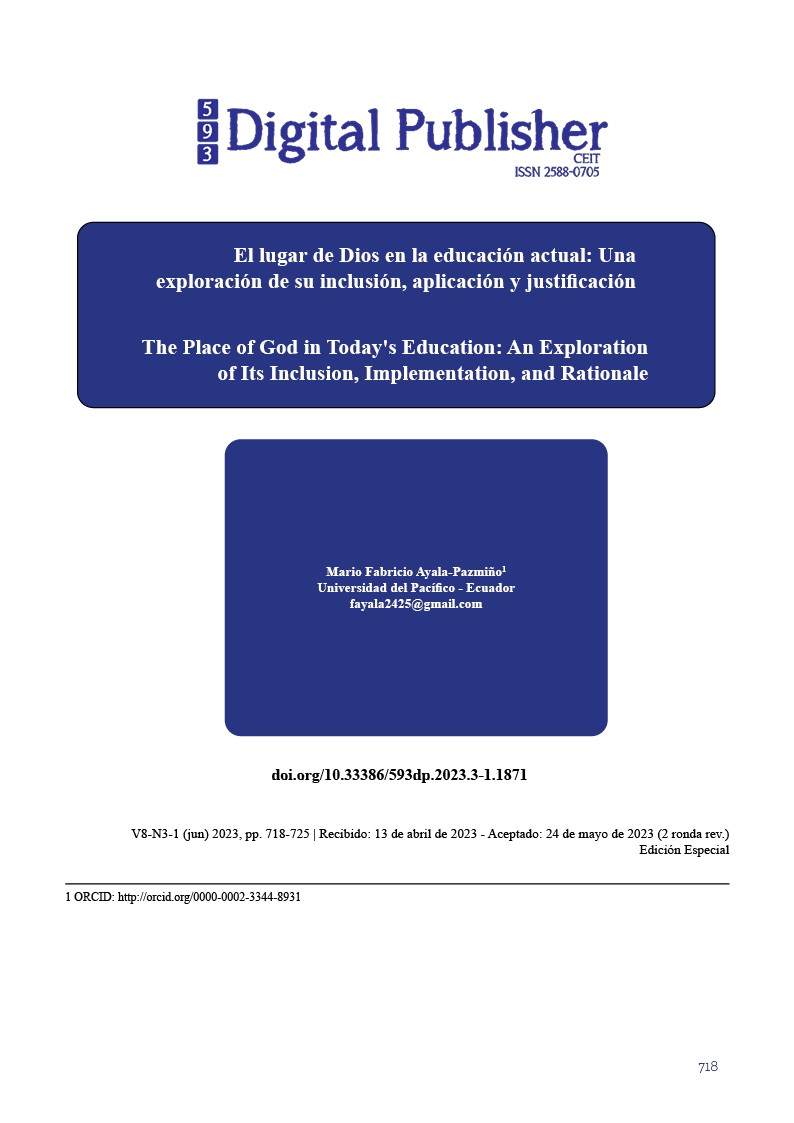The Place of God in Today's Education: An Exploration of Its Inclusion, Implementation, and Rationale
Main Article Content
Abstract
The role of religious and moral education in modern education has been the subject of considerable debate in recent years. While some argue that religion has no place in education, others maintain that including religious beliefs can positively impact students' moral and spiritual development. This literature review examines current research and perspectives on the issue of incorporating God's values into education and its potential impact on students' moral development, personal fulfillment, and social connectedness. The author suggests that future research could focus on examining the impact of religious and moral education on students' moral reasoning and behavior through longitudinal studies, exploring effective teaching methods for diverse and inclusive classroom settings, and investigating the potential benefits and challenges of incorporating God's values into online learning environments. By equipping students with the tools to make ethical and responsible decisions, religious and moral education can significantly foster a more respectful, compassionate, and sustainable society.
Downloads
Article Details

This work is licensed under a Creative Commons Attribution-NonCommercial-ShareAlike 4.0 International License.
1. Derechos de autor
Las obras que se publican en 593 Digital Publisher CEIT están sujetas a los siguientes términos:
1.1. 593 Digital Publisher CEIT, conserva los derechos patrimoniales (copyright) de las obras publicadas, favorece y permite la reutilización de las mismas bajo la licencia Licencia Creative Commons 4.0 de Reconocimiento-NoComercial-CompartirIgual 4.0, por lo cual se pueden copiar, usar, difundir, transmitir y exponer públicamente, siempre que:
1.1.a. Se cite la autoría y fuente original de su publicación (revista, editorial, URL).
1.1.b. No se usen para fines comerciales u onerosos.
1.1.c. Se mencione la existencia y especificaciones de esta licencia de uso.
References
Austin, M. W. (2006). Empathy and Prosocial Behavior in Undergraduate Students: A Comparison of Religious and Non-Religious Individuals. Archive for the Psychology of Religion, 28(1), 65–87. https://doi.org/10.1163/157361206775107141
Damon, W. (2008). The path to purpose: How young people find their calling in life. Free Press.
Dyal, C. A., & Roozen, D. A. (2011). Religious Education, Civic Engagement, and Community Building: A National Study of American Youth and Young Adults. Religious Education, 106(3), 294–310. https://doi.org/10.1080/00344087.2011.604408
Haynes, C. C., & Thomas, O. (2007). Finding Common Ground: A First Amendment Guide to Religion and Public Schools. First Amendment Center. Retrieved from https://www.firstamendmentcenter.org/wp-content/uploads/2012/05/finding_common_ground.pdf
Idler, E. L. (2014). Religion, spirituality, and mental health: A review and synthesis. In Handbook of the sociology of mental health (pp. 277-296). Springer, Dordrecht.
Kelsey, J. D., & Hallett, J. D. Jr. (2010). The moral compass of emerging adults. Journal of Adolescent Research, 25(3), 327-355. doi: 10.1177/0743558410361378
Marcille, J. A. (2011). Science literacy among the faithful: What do religiously committed students know? Journal of Research in Science Teaching, 48(9), 1026-1049.
Marty, M. E. (2015). Religion and critical thinking: Divergent paths. Religious Education, 110(3), 269-277.
McQuade, J., & Dougherty, K. D. (2014). Religious education and adolescent substance use. Journal of drug issues, 44(1), 74-92.
Westerhoff, J. H. (1987). Will our children have faith? Revised ed. Seabury Press.
Witte Jr., J. (2008). Why the secular state needs religion: A jurisprudential defense of secularism and religious freedom. The University of Virginia Press.
Yasemin Esen & Meliha Altunisik (2013) The Effect of Religious Education on Minority Groups: The Case of Turkey, Journal of Beliefs & Values, 34:2, 189-200, DOI: 10.1080/13617672.2013.783785


